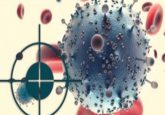Lung cancer recurrence detected earlier by circulating tumor cell test

A study presented recently at the 2017 Multidisciplinary Thoracic Cancers Symposium (16–18 March, San Francisco, USA) reported that a blood test harnessing circulating tumor cells (CTCs) as biomarkers could detect lung cancer recurrence an average of 6 months before conventional imaging methods. The blood test could be utilized to aid the personalized treatment of patients with non-small-cell lung cancer (NSCLC).
Currently, patients diagnosed with NSCLC undergo CT or PET/CT scans that monitor the recurrence of cancer. However, the new biomarker blood test tracks CTCs, which could be used as a less invasive surveillance follow-up. Through using a combination of imaging techniques and monitoring CTCs levels, the diagnosis of cancer recurrence could be significantly earlier.
Lead author Chimbu Chinniah (University of Pennsylvania, PA, USA) commented: “The additional lead time afforded by an earlier diagnosis may enable doctors to better tailor alternative and salvage treatments to improve their patients’ outcomes and quality of life. Earlier detection of recurrence may even translate into an increased likelihood of curing these patients when their tumor burden is lowest and thus more likely to respond to therapy.”
The prospective clinical trial enrolled 48 patients, aged 31–84 years, with stage II–III locally advanced NSCLC. Patients received concurrent chemoradiation, with blood samples obtained before, during and after treatment. The samples were analyzed with an adenoviral probe detecting specific elevated enzymes to identify circulating tumor cells. At 3-month intervals, patients also underwent CT or PET/CT surveillance scans.
The study results demonstrated that at a median follow-up of 10.9 months following NSCLC treatment, 22 (46%) patients experienced recurrence detected by CT scans. Blood samples were obtained from 20 patients of these 22 patients after chemoradiation treatment. In total, 15 out of these 20 had elevated CTC levels following treatment, and two-thirds of those 15 individuals demonstrated an increase in CTCs an average 6 months before conventional scans detected the recurrence.
Charles B Simone, II (University of Maryland School of Medicine, MD, USA) concluded: “The future use of circulating tumor cells as a diagnostic and prognostic tool for localized NSCLC looks promising. Although imaging remains the cornerstone of post-treatment surveillance for patients, blood tests could, and perhaps should, be used in conjunction with imaging scans to better monitor patients during their follow-up period after treatment.”
Sources: https://www.astro.org/News-and-Publications/News-and-Media-Center/News-Releases/2017/Biomarker-blood-test-shows-cancer-recurrence-months-before-CT-scans/
Also featured on our sister site, Bioanalysis Zone.



